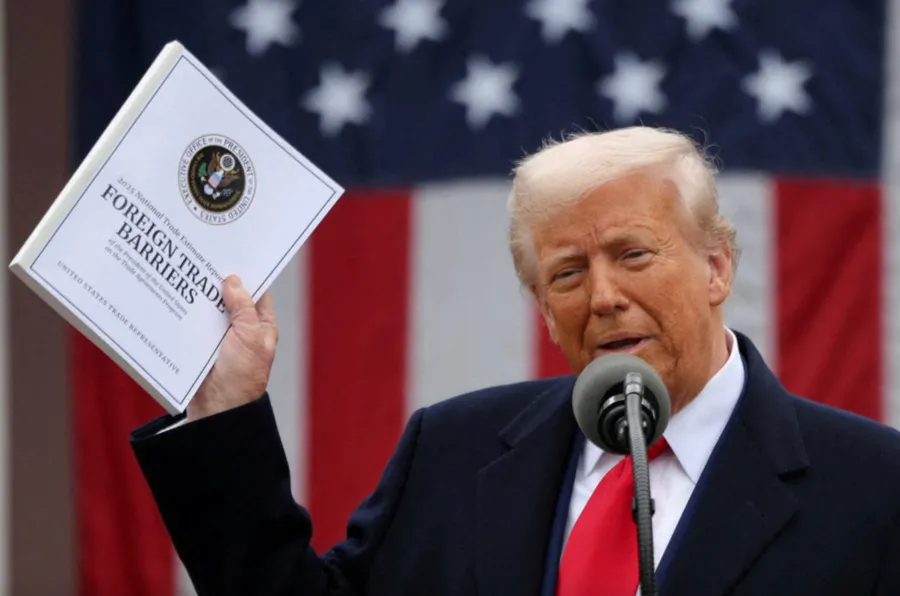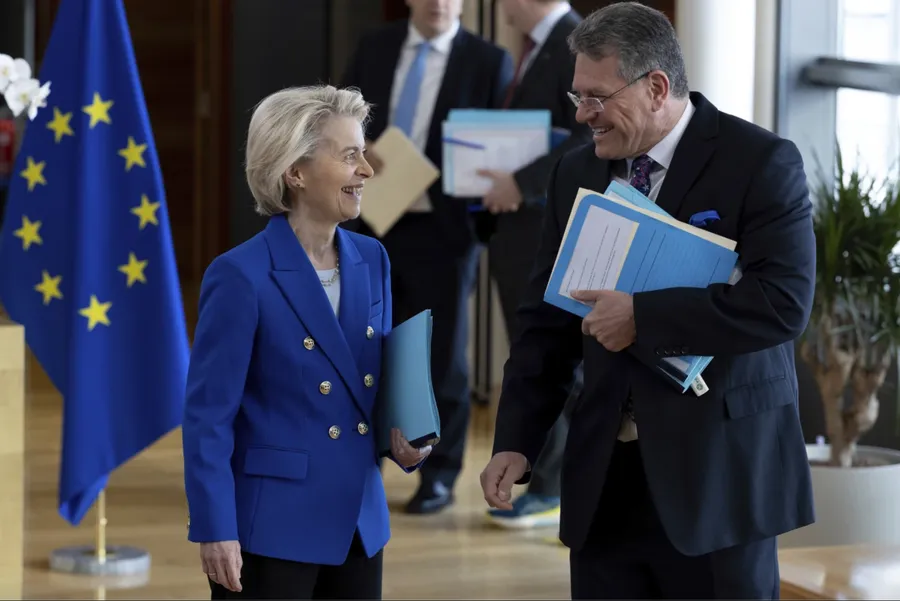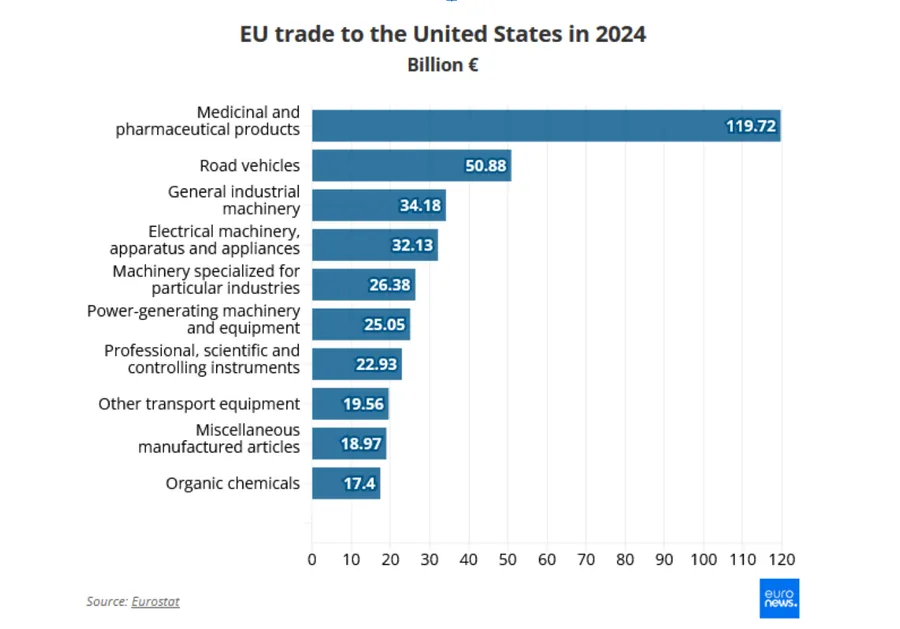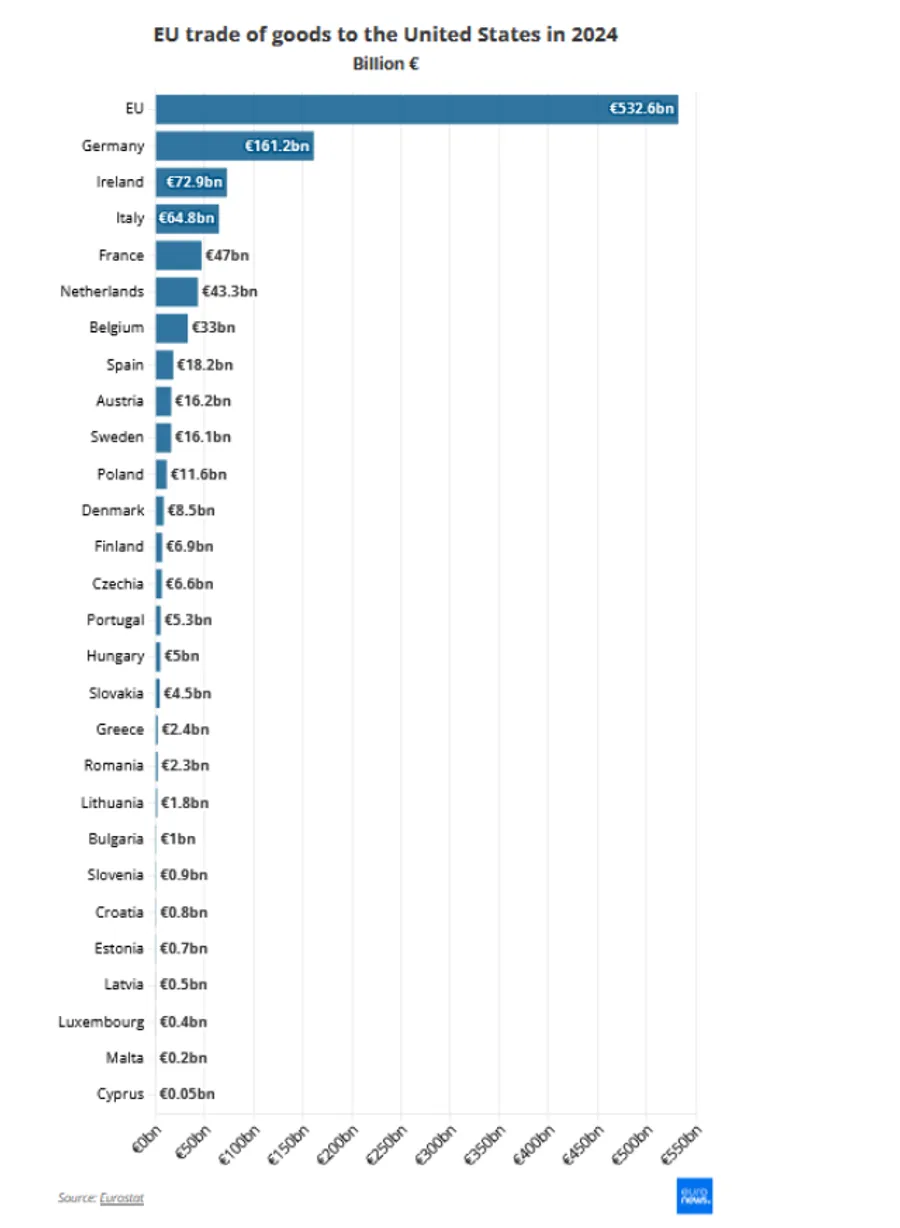
Tariffs, Threats, and Transatlantic Tensions
by u/Case_Newmark
President Donald Trump posted a letter to EU Commission President Ursula Von Der Leyen and Mexican President Dr Claudia Sheinbaum on his Truth Social account on Saturday, intending to raise tariffs on goods to 30%. Trump noted that the rate could increase further should the EU retaliate; adding whatever percentage increase the EU does on top of the 30%. The number is "far less than what is needed to eliminate the Trade Deficit disparity”, according to the President.
The Commission responded with a statement saying, “We remain ready to continue working towards an agreement by August 1 … we will take all necessary steps to safeguard EU interests, including the adoption of proportionate countermeasures if required."
“We have had years to discuss our Trading Relationship with The European Union, and we have concluded we must move away from these long-term, large, and persistent, Trade Deficits, engendered by your Tariff, and Non-Tariff, Policies, and Trade Barriers,” Trump wrote. “Our relationship has been, unfortunately, far from Reciprocal.”
With the new letters, Trump has issued tariff conditions on 24 countries of the 27-member European Union.
The news cannot come as a shock to the EU, as Trump spent the past week reigniting the embers of the trade war. He planned to impose 50% duties on copper goods, causing prices to soar to all time highs. Thursday, he threatened a 20% tariff on all imports, as well as a 35% tariff rate on Canadian imports.
The letters come on the backs of the failed “90 deals in 90 days” proposed by Stephen Miller, forcing the Trump administration to delay their deadline; a practice they are quickly becoming familiar with. Instead, these new letters are meant to, as put by Michael Brown at Pepperstone in London, “escalate to de-escalate”. A strategy meant to force trade partners into concessions through fear of the tariff’s consequences. "Depending on what happens in the next 24 hours or so, I imagine that the knee-jerk move is euro-negative, euro-zone asset-negative. And then, as calmer heads prevail, it comes back to the fact that, is it just a negotiating gambit?," he said.
Fumbling Faith in a Fractured Friendship
The letters rocked Europe on Saturday, and as trade ministers prepare to meet in Brussels on Monday, the question is, what’s next?
The letters have surely rocked Europe’s cautious approach to the Trump administration, looking to build bridges and attempt concessions to avoid further escalations. The letters may be a wake up call that this strategy is not effective.
On Friday, the Commission said it stood ready for a deal with the U.S. on tariffs, and had no plans for further meetings between the two sides over the weekend, betraying their optimism in the face of uncertainty. Their priority was, as put by trade spokesperson Olof Gill, was “achieve an agreement in principle with the U.S.” and that they “await some indication from our American counterparts that they are ready to do the same”. Olof was waiting for an indication from Trump like Gatsby awaited an indication from Daisy. In fact, Trump had clearly indicated the opposite. “They’re very tough, but now they’re being very nice to us, and we’ll see what happens,” Trump said. “We’re probably two days off from sending them a letter”. A letter “meant a deal”, he added.
But these ‘kind’ words from him mean nothing in the face of his past history. He had long lauded the EU’s trade policy. He attacked the EU’s taxes on digital services. As explained by CNN’s Auzenia Bacon, digital service taxes are levied on the gross revenue that online firms collect from offering services to users. Countries with these taxes would be able to tax all the revenue large companies that operate online collect, even if the business is unprofitable. That can include what they collect from selling data, advertising as well as payments they receive for subscriptions, software and other kinds of online services users pay for. Trump repeatedly attacked the EU, claiming they weren’t negotiating in good faith.
And on June 1st. Trump stated he was “Not looking to make a deal”. One of the most honest things he’s said in regards to his trade policies. This fell on deaf ears to the EU, however, and they continued to operate under the assumption that Trump would negotiate in good faith with them. Trump Always Chickens Out, after all.

European Commissioner for Trade and Economic Security Maros Sefcovic, right, speaks with European Commission President Ursula von der Leyen, during the weekly meeting of the College of Commissioners at EU headquarters in Brussels, April 9, 2025. (AP Photo/Omar Havana, File)
“We are looking for a clear framework from which we can keep building,” Ursula von der Leyen, told the European Parliament on Wednesday morning. The EU tried its best to capitulate to the US. Initially, officials were openly critical of the UK’s bare-bones deal. One vowed “We will never do a deal like Starmer”. They wanted a position between a rollover UK and retaliatory China.
“If the EU doesn’t stand up to Trump or demand the rigors of rules, the question will be: what is left of the international rules-based system?” one diplomat told the Guardian, speaking of the risk to employment rights, free speech, social welfare and public care.
But last week, the position shifted. The EU was now pursuing a bare-bones deal, hoping for relief from the 27.5% tax on car exports, the 50% import duties on steel in exchange for a 10% tariff for most imports. This deal was put on Trump’s table on Wednesday, and the EU has waited with bated breath. The EU is starting to recognize the Russian threat, and as a result, sacrificed trade for security. This did not sway Trump, and he threw away a good deal in favor of posturing to his base.
The European Response
As trade ministers meet in Brussels on Monday to determine whether or not to lift the EU’s retaliatory tariff suspension, the question of how Europe responds comes into question.
“Imposing 30% tariffs on EU exports would disrupt essential transatlantic supply chains, to the detriment of businesses, consumers and patients on both sides of the Atlantic,” Ursula von der Leyen said in a statement. “The EU has consistently prioritized a negotiated solution with the U.S., reflecting our commitment to dialogue, stability, and a constructive transatlantic partnership.”
But Ursula’s cautious words were not echoed by every nation. Some, like Macron, used stronger language. “... In European unity, it is more crucial than ever for the Commission to assert the Union’s determination to resolutely defend European interests. This notably involves accelerating the preparation of credible countermeasures, by mobilizing all available instruments, including the anti-coercion mechanism, if no agreement is reached by August 1.”
Micheál Martin, Taoiseach of Ireland, had this to say. “The EU and US enjoy the biggest trade and investment relationship in the world. When issues arise between us, they should be resolved by close and respectful dialogue ... While it has been clear that all options remain on the table, the EU has also been clear that our preference is for a negotiated solution that avoids escalation. That remains the case.”
It is worth nothing that, alongside Germany, Ireland is the most affected by Trump’s tariffs. If Washington targets pharmaceuticals, Ireland, Denmark, and Belgium would be severely affected.


More than 53.7% of Ireland's exports go to the US, making exports to the US 18% of Ireland’s total GDP. Pharma exports represent nearly 55% of their exports. The impact could, according to the BCA, curtail 4% to 5% growth over time. Brugeul, a Brussels based think tank, estimates the real GDP loss could be 3% by 2028. Trump’s threats to raise tariffs on pharma goods to 200% are seen in Europe as more TACO talk, as increasing prices of healthcare for US voters could be too costly for his popularity. But this same line of thinking led to the 30% tariff letter. Trump does not respond to capitulation, he is a bully, and if he sees weakness, he will take more and more. His tit for tat escalation with China ended in a humiliating loss that he had to sweep under the rug.
As the Brussels meeting looms, and retaliatory tariffs hang in the balance, ministers should take note of how Trump reacts to responses on his tariffs. He does not respond with cooperation, but with escalation. He has shown time and again, from the failed “90 deals in 90 days” to his rejection of the EU’s Wednesday proposal, that conciliation is mistaken for weakness.This is not negotiation but coercion masked as diplomacy. Trump isn’t waiting for a deal. He is waiting for the EU’s complete surrender. And yet, if the EU continues to chase after empty promises, “awaiting some indication” like Gatsby waiting for Daisy, they will find themselves steamrolled by a man who has no intention of playing fair. Trump only respects strength, just look at his worship of strongman leaders. To fold now is to forfeit the rules-based order that Europe claims to defend. The EU cannot deter a bully by appeasing him; they must stand up, or prepare to be walked over.